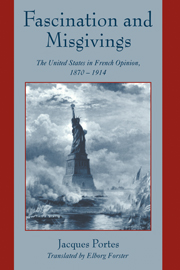Conclusion
Published online by Cambridge University Press: 07 October 2009
Summary
French opinion concerning the United States continued to express itself after 1914, despite the importance of this break; but one must choose a crucial moment to end such a study. Otherwise, especially in as shifting and diffuse a domain as the study of opinion, one might continue all the way to the present.
It should be pointed out that in a curious way the last years of the nineteenth century seem to be winking at our own, the last of the twentieth. One has only to evoke the first centennials of the Declaration of Independence and, later, the Constitution, to see that they were echoed by the French celebrations of the corresponding bicentennials: They were proof of a continued American presence. One has only to evoke the apprehensive reactions of the French to the deployment of American power around 1900 to conjure up those of the 1950s. One has only to recall French admiration for material comforts – running water and electricity – around 1900 to bring back that of the 1960s – household appliances and automobiles for everyone.
In the study of opinion the “concordance of times” can open troubling perspectives; it might make us believe that continuity carried the day and that neither the United States nor the French have changed. This, of course, is not the case; more simply, these astonishing similarities show the extent of the renewal the United States had undergone since the early nineteenth century. Having wholeheartedly embraced modernity, it had more or less explicitly become the symbol of that trend; by 1880, after all, it had already invented the skyscraper and the trust, to mention only these examples.
- Type
- Chapter
- Information
- Fascination and MisgivingsThe United States in French Opinion, 1870–1914, pp. 433 - 438Publisher: Cambridge University PressPrint publication year: 2000



